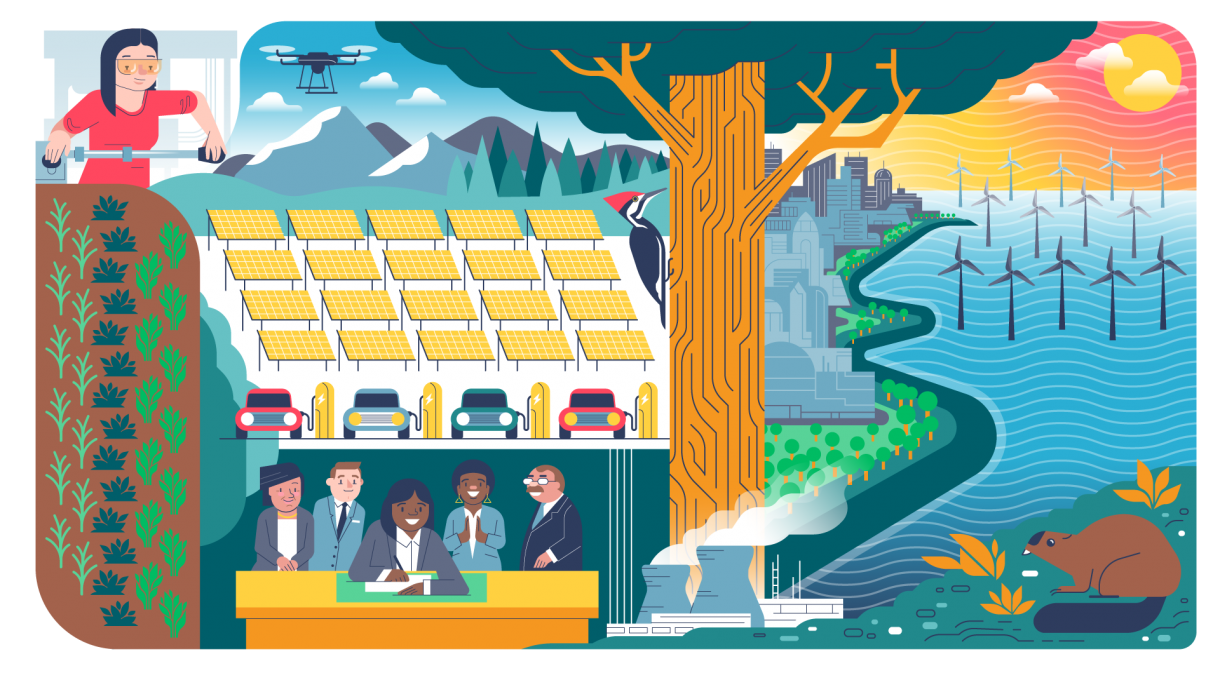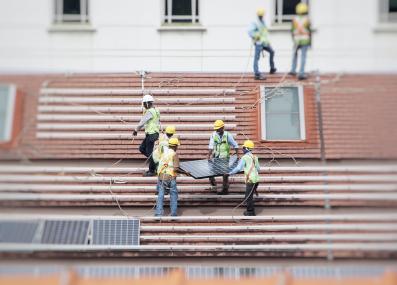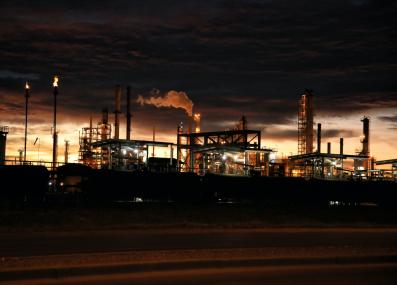New to Climate Change?
What Can Be Done About Climate Change
It is not too late to take action on climate change.
The Science
Given what we know about the threats that climate change poses to humans, we must take swift action. As a global community, we need to soon level off—and then decrease—the amount of carbon dioxide (CO2) and other greenhouse gases in the atmosphere. The faster we do this, the less damage we will cause to our world and our way of life.
Stopping the Rise in CO2
The fastest way to address the buildup of CO2 in the atmosphere is to stop adding more. Many vital parts of our economy emit huge amounts of greenhouse gases: the way we generate electricity and heat for our buildings and industry; the oil we burn to power our cars, trucks and planes; the refrigerants we use to preserve our food and cool our buildings; and the intensive manufacturing processes for making concrete and steel.
And yet there are many ways to reduce the CO2 from these sectors. We can replace high-emitting fuels like coal, oil and gas with nearly “carbon-free” alternatives, such as solar power, wind power, or nuclear power. We can capture the CO2 from fossil fuel power and manufacturing plants and store it underground. We can also update our buildings and infrastructure, so that it takes less energy to build and use them.
We can add to these efforts by trying to remove some of the CO2 that is already in the atmosphere: for instance, by reforesting the Earth, by changing our farming practices to store more carbon in the soil, or through “direct air capture” technology. However, these methods will likely not be able to remove CO2 quicker than we are now adding it to the atmosphere. We must begin with stopping our runaway greenhouse gas emissions.
Adapting to Change
Because human activity has already added such a large amount of greenhouse gases to the atmosphere, the world is now experiencing the early effects of climate change. We need to prepare for and adapt to these changes, so that we can protect human health, water and food supplies, our cities and towns, and natural habitats. A new field of work has emerged to reinforce coastlines to shield them from rising oceans, grow new crops to match regions’ changing climates, protect our infrastructure from wildfires and hurricanes, and plan for shifting supplies of water and food.
Today, these tasks are still manageable. If we get ahead of the regional changes we know are coming, and if we put the needs of the poorest and most vulnerable first, very few parts of the world will be irreparably damaged by the climate change we have already caused.
But unless we also actively cut our greenhouse gas emissions, unchecked climate change could eventually put safe and just adaptation beyond our reach. This possibility has led some scientists to study more extreme and controversial options, like geoengineering; for example, there are proposals that would try to artificially cool the Earth to counter some of the effects of climate change. Urgent action is needed to avoid the need for these riskier options.
Driving Solutions
Great progress can and must be achieved with the low-carbon technologies we have today. And all of us can help speed the pace at which these technologies take root and spread. Individuals can change their behavior and advocate for ambitious new policies. Corporations can drive change across whole industries. Governments can enact laws to make it easier and cheaper to cut greenhouse gas emissions, and to help communities prepare for new challenges. And intergovernmental agreements such as the Paris Agreement have already created a strong framework for international cooperation and aggressive action, if governments around the world step up their commitments.
At the same time, the world does not have a true alternative to fossil fuels that can meet all our current energy needs, let alone meet an increased demand in the future. We severely lack the suite of solutions to address climate change at an economic and social cost that we can agree to bear.
A tremendous amount of work is taking place at MIT and other scientific and engineering institutions around the world to develop these options, in collaboration with the industries and communities that can deploy and scale them. But to quicken the pace of technological breakthroughs, policymakers need to set the stage now for game-changing advances in multiple fields of science, technology, and policy. To take on the hardest challenges in reducing our emissions, in removing CO2 from the atmosphere, and in adapting to a changing climate, we urgently need new tools.
Seizing the Opportunity
The MIT community fundamentally agrees that climate change presents grave risks that demand society’s urgent attention. The challenge requires an aggressive and pragmatic plan to achieve a net zero carbon global energy system, the sooner the better, for all of humankind.
If academia, business, government, and citizens act together toward this common goal, we can create a pollution-free energy system; form a prosperous, adaptable and resilient society; keep human, animal, and plant life flourishing; and create a better world for ourselves and generations to come.
You may notice that we, the writers on this site, use the word “we” to collectively refer to those who have benefitted in various ways from burning fossil fuels, those who will face the impacts of climate change, and those whose responsibility it is to act. We did this intentionally to create a sense of community in addressing this challenge.
However, we acknowledge that people and groups across the globe have not equally benefitted from the use of fossil fuels, and many – including young people and future generations – will disproportionately endure the consequences. We, those who are affiliated with MIT and those who live in developed countries, are often among those whose activities have historically had a disproportionate impact on climate change. Therefore, we see that we have a greater responsibility – as professionals, citizens, community members, and consumers – to act to reverse its course.





